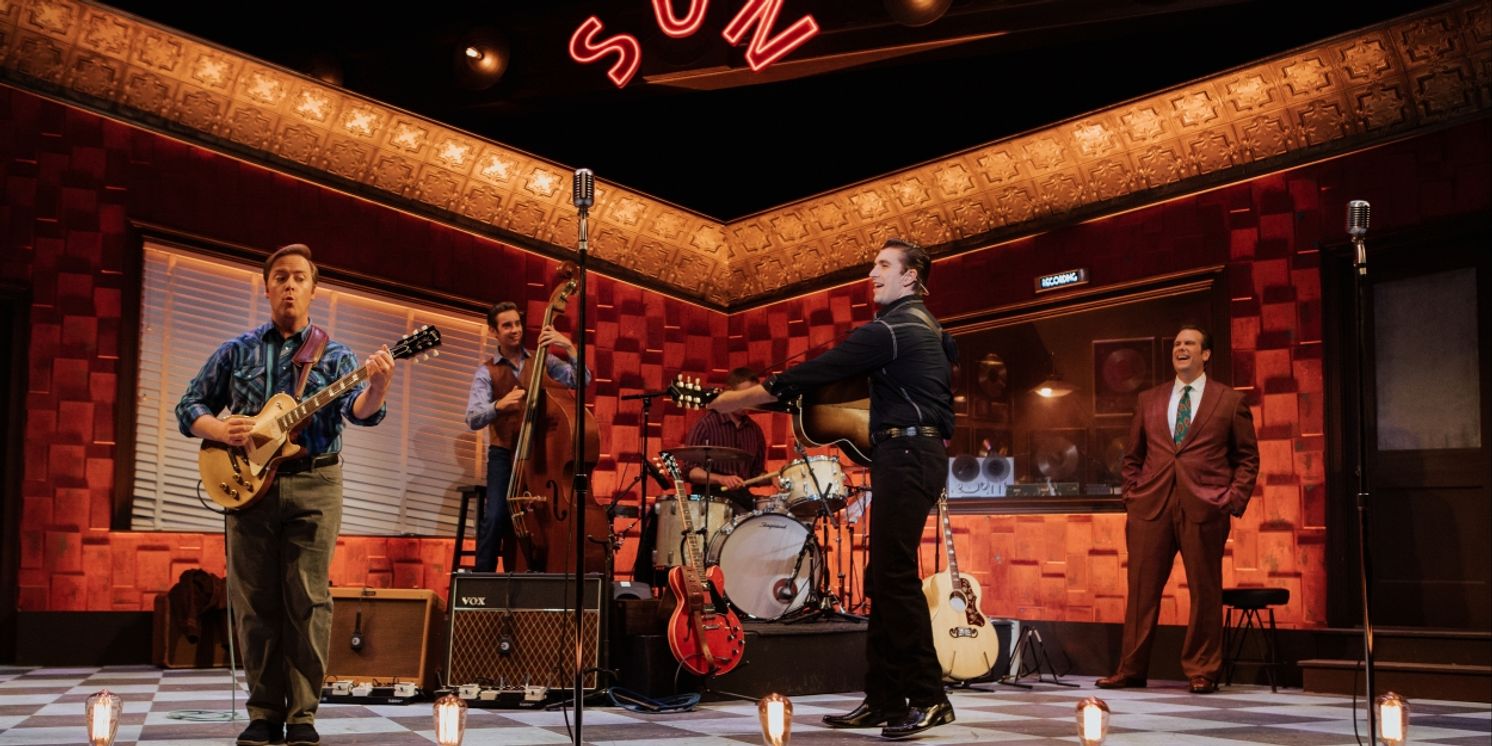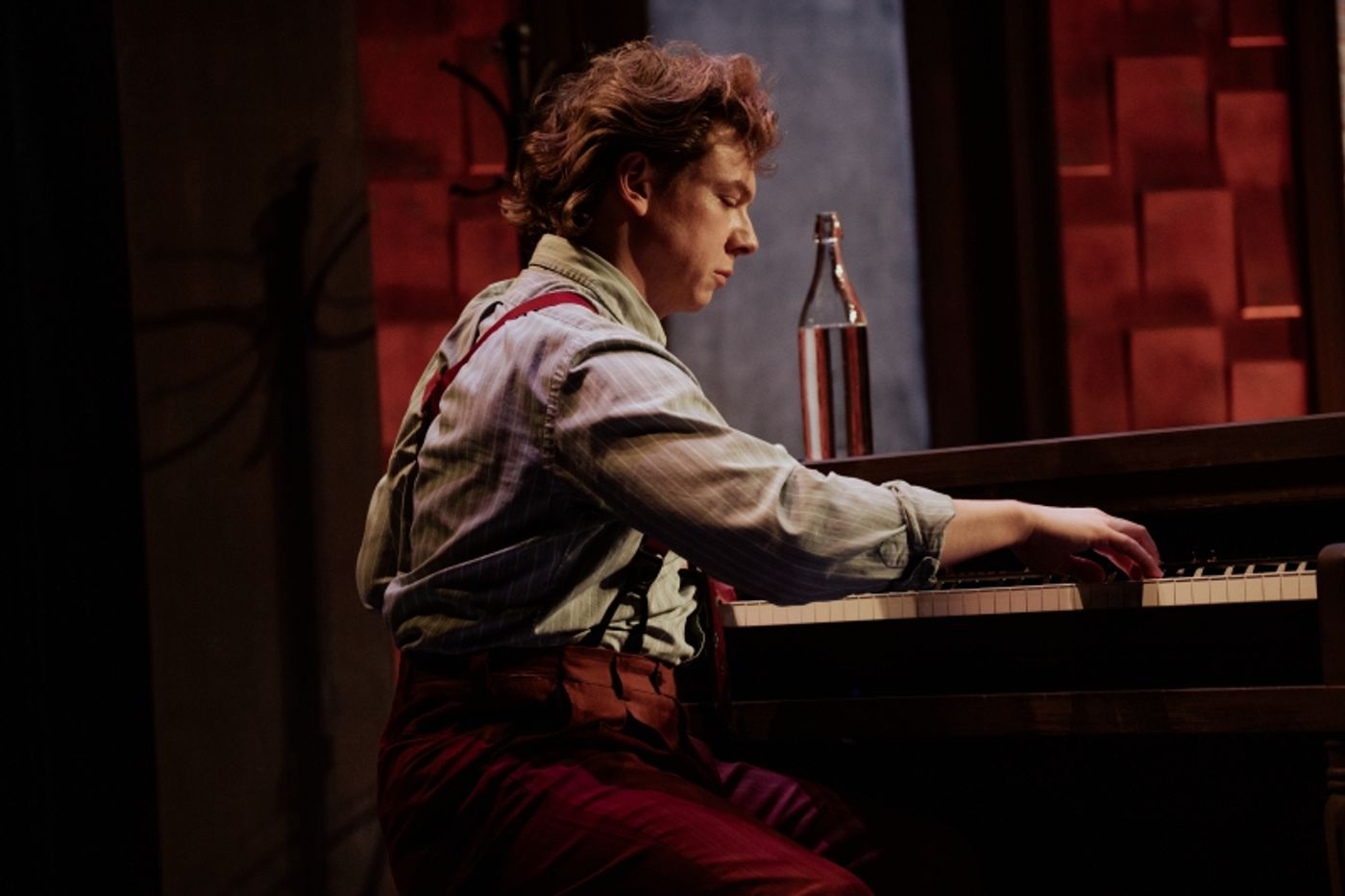Studio Tenn Inaugurates Sparkling New Turner Theatre With Electrifying MILLION DOLLAR QUARTET
Director Patrick Cassidy Directs Stellar Cast in Memphis-Based Musical About Legends and Icons

There has long been a story – a legend, if you will, that has been confirmed as a significant moment in modern music history – told in my hometown of Bethel Springs, a tiny hamlet in West Tennessee, about an appearance in September 1954 by a newcomer named Elvis Presley, accompanied by his record producer Sam Phillips. Long before he was “The King,” Presley appeared in a sparsely attended concert in the gymnasium of the local high school (where my older siblings studied), where he opened with “That’s All Right, Mama” and “Blue Moon of Kentucky,” as he tried to find his place in contemporary show business, straddling the lines – both socially-defined and imaginary – that divided rhythm and blues/rockabilly and country music.
 Clad in his trademark black, white and pink stage clothes, Elvis (already rocking his pelvis in those early days of his fledgling career) was a favorite of the young women in the audience, while the older, more conservative types were reputedly nonplussed by the performance they were seeing. But, clearly, it was a sight to behold and folks were still talking about it by the time I was born and as they continue to do now in the 21st century.
Clad in his trademark black, white and pink stage clothes, Elvis (already rocking his pelvis in those early days of his fledgling career) was a favorite of the young women in the audience, while the older, more conservative types were reputedly nonplussed by the performance they were seeing. But, clearly, it was a sight to behold and folks were still talking about it by the time I was born and as they continue to do now in the 21st century.
It just so happened that on that September evening in 1954 among the concert-goers were Carl and Jay Perkins, music-making brothers from about 30 miles away in Jackson, who had heard of what Presley was doing and came to see for themselves if the stories were true. The legend has it that as Elvis was heading toward Carl, both men with their hands outstretched for a hearty good ol’ boy shake, he stumbled (whether over his own feet or an amplifier cord or whatever else – well, that remains debatable), and he sorta fell into Carl and, as we now know, musical history was made.
Had I been aware that the same floor upon which I staged and directed (and acted in, etc.) my very first self-written play was indeed hallowed ground, chances are I would have turned it into a musical. Perhaps now is the time to check that off the bucket list, but it’ll have to wait while I finish this review of Studio Tenn’s rambunctious, rollicking and rockin’ production of Million Dollar Quartet – the musical based on another, even more consequential moment in musical history that took place in Memphis’ Sun Studios two years later.

A musical retelling of producer Sam Phillips' serendipitous gathering of four of music's most notable Southern boys - Carl Perkins, Jerry Lee Lewis, Johnny Cash and Elvis Presley - at his Memphis-based Sun Records Studio on December 4, 1956, Million Dollar Quartet will set your feet to tapping out a steady rhythm from its very first moments (a performance of Perkins’ “Blue Suede Shoes” that very nearly blows the roof off Studio Tenn’s brand spanking new Turner Theater at The Factory in Franklin) and will keep your heart pumping right along to the very final notes of Jerry Lee's “Whole Lotta Shakin’” that closes out the concert musical that is directed by Studio Tenn artistic director Patrick Cassidy and featuring an exceptional cast of performers who pay homage to their eponymous counterparts with so much talent and commitment that you’re breathless – but still wanting more – by the time the curtain closes two hours later.
Considered a seminal moment in the history of rock and roll, that mighty Memphis night of December 4, 1956, is brought to life onstage in a way that gives each legend his moment in the spotlight, while contrasting the men's various personalities and styles of performing, doing business and living life. Million Dollar Quartet is fast-paced and lean – as musical theater, there are no wasted or contrived moments to deter from the story being told – and it’s clearly a show audiences could watch time and again and still find something new and fascinating to enthrall them.
Why it’s taken so long for a Nashville production of Million Dollar Quartet to be staged locally is beyond me and when Studio Tenn announced its intentions to open its new performance home – the aforementioned Turner Theatre is sparkling and shiny and has that new-car smell that infuses you with excitement and anticipation – my first response was how smart artistic director Cassidy was in choosing this show to inaugurate the new venue. And judging from audience reaction during the performance reviewed, the man knew exactly what he was doing!
With sets and costumes designed by Studio Tenn founder Matt Logan, whose attention to detail is obvious in every design element onstage: the forced perspective of his depiction of the Sun Studios set gives a heightened sense of theatricality to the proceedings, while the actors are costumed to sheer perfection – you simply must appreciate how beautifully fitted every article of clothing is, how the accessories fit the particular fashion of the era and how everything connects in order to firmly establish the time and place in which the action transpires on the stage – and the entire production is elevated by his exquisitely focused designer’s eye. His longtime collaborator Mitch White’s role as scenic director ensures the production’s visual aesthetic is as memorable as the performances.
The story of how the now iconic moment came to be, indeed how the legend was born – which became known the world over as "Million Dollar Quartet" after a story published in the Memphis Press-Scimitar (the afternoon daily newspaper that I delivered as a kid), spawned by the release in Europe of recordings from the legendary jam session that grew out of the four men stopping by Sun Records on a chilly December evening in 1956 – is evident throughout the musical, with Phillips himself as docent, taking audiences through his experiences with each of the men as they evolved from good, if poor, ol' boys into entertainment legends.
Million Dollar Quartet takes audiences on an enlightening journey through musical history, and as Phillips tells how he met Perkins, Lewis, Cash and Presley, the legendary performers become more accessible, their stories amazingly similar (each man came from dirt-poor beginnings in the rural South) and the stuff of which music history, particularly music in Memphis, was made. The show's score makes grand use of each performer's best-known songs, offering a catalogue of songs perhaps unparalleled in the evolution of rock and roll music, told from a uniquely Tennessee perspective.
Million Dollar Quartet captures the city's down-home, barbecued flavor with a tremendous sense of style that fairly radiates from the show’s book by Colin Escott and Floyd Mutrux. The show's heart, as expansive as the mighty Mississippi River that separates the Volunteer State from Arkansas, reverberates dramatically and thematically in the two hours of music that renders a sense of timelessness. Once the show is over, you’re likely to find yourself still caught up in the previous two hours of nonstop entertainment that is Million Dollar Quartet, and you’ll find yourself longing for a trip to Memphis.
Cast as the four musical’s four icons, the members of director Cassidy’s cast have built their careers upon various productions of Million Dollar Quartet, allowing each man the time to become the character he plays, to assume the mantle of his personality and the significance of his contributions to musical history. Jefferson McDonald (who doubles as musical director) is dazzling as Jerry Lee Lewis, showing off his musical theater bona fides with an unparalleled performance that defies description. The singularly named Cole’s portrayal of Elvis Presley is made all the more compelling by his rather understated performance; instead of relying on an impersonation, he delivers a personal interpretation of The King that seems even more authentic than could be expected. As Carl Perkins, Christopher Wren appears somewhat more down-to-earth (just as the character he plays was in life, coming from a share-cropping family in Madison County), but nonetheless shows off his own alarming theatricality in a highly energized performance. Finally, as The Man in Black, Christopher J. Essex is the consummate tall, dark and handsome Johnny Cash, delivering his lines in a bass tone that is electrifying and rather startling. Each of the four has plenty of stage presence to spare – together, they are almost other-worldly.
As Phillips, Nashville actor Moot Davis commands the stage just as one would expect a driven and hard-working producer to be (although I have quibbles about how he says “directly”). Emma Rose Williamson, a senior at Lipscomb University, is sublime as Dyanne (Elvis’ current girlfriend in the piece), delivering terrific performances of “Fever” and “I Hear You Knocking” that allow her to hold her own with the men of the production, but the real strength of her perfectly nuanced performance is found in her quieter moments onstage, when she is “present” in every scene, no matter how “small” her role might be written.
In addition, Jared Manzo is great as Jay Perkins, with Blake Oswald equally so as Fluke, the drummer for Carl Perkins. That the four stars, Manzo and Oswald provide the stunning musical accompaniment adds even more authenticity and genuine musicianship to the evening.
Mark Zuckerman’s stellar sound design creates a solid audible experience that finds the sweet spot among the intimate, personal moments as impressively as it makes the big musical moments so amazing. Likewise, Michael Barnett’s lighting design captures the sense of timelessness of the story being told onstage, while providing the ideal and eye-popping illumination during the concert scenes that result in an overall delightful theatrical experience. Hilary Frame’s props design is noteworthy for its period-perfect details.
Million Dollar Quartet. Book by Colin Escott and Floyd Mutrux. Original Concept and direction by Floyd Mutrux. Inspired by Elvis Presley, Johnny Cash, Jerry Lee Lewis and Carl Perkinis. Directed by Patrick Cassidy. Musical direction by Jefferson McDonald. Stage managed by Cecilia Lighthall. Presented by Studio Tenn at Turner Theatre, The Factory at Franklin in Franklin, Tennessee. Through November 5. For further details, go to www.studiotenn.org. Running time: 2 hours (with one 15-minute intermission).
production photos by Lily Nelson
press photos by Samantha Hearn
Videos

